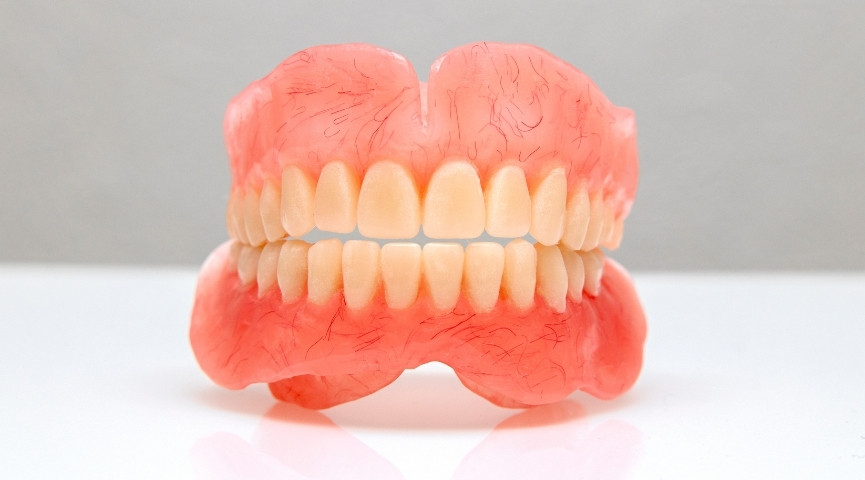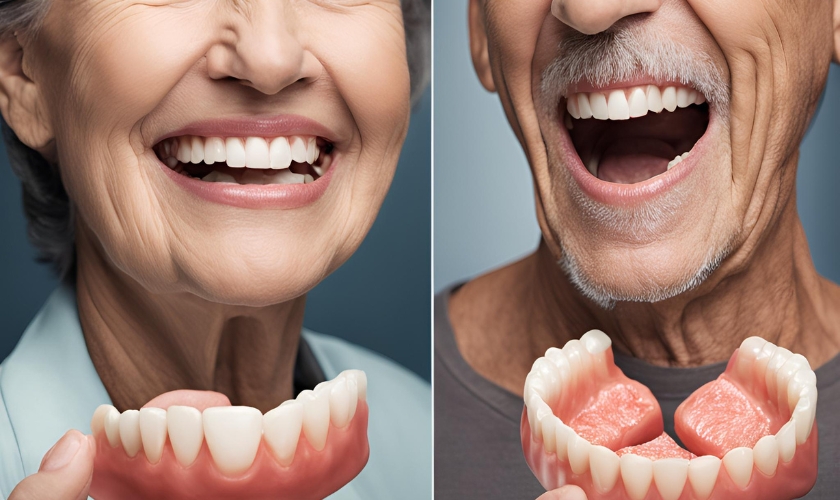
By Thrive Family Dentistry of Auburn | November 22, 2024
Dentures can significantly impact self-esteem and emotional well-being. Approximately 40% of individuals experience feelings of insecurity and anxiety during the initial stages of wearing dentures. Although dentures restore vital functions like speaking and eating, they also introduce emotional challenges related to appearance and social interactions.
This blog will explore how dentures affect self-confidence and provide effective strategies to help individuals overcome self-consciousness. With a focus on practical tips and positive mindset techniques, the post aims to guide readers in embracing their new smile and building lasting confidence.
The Emotional Challenges of Getting Dentures
For many people, the thought of wearing dentures brings feelings of self-consciousness and anxiety. At first, there may be embarrassment about the change in appearance or the fear of dentures not fitting well. These feelings often stem from the concern that others might notice the dentures and think they look unnatural. This fear can lead to intense self-doubt, affecting the person’s mental and emotional well-being.
In addition to anxiety, social isolation is a common emotional response. People who feel self-conscious may withdraw from social activities, avoiding situations where they need to speak or eat in front of others. This isolation can exacerbate feelings of loneliness and sadness, affecting relationships and quality of life.
The fear of judgment also plays a significant role. Many denture wearers worry that people will notice their dentures or think less of them because of them. This fear of being judged can prevent individuals from fully embracing their new smile and feeling comfortable in social situations. These emotional struggles are common but can be addressed with time, patience, and the right strategies.
The Psychological Effects of Missing Teeth
Missing teeth can profoundly impact self-image and identity. For many, teeth are closely tied to how they view themselves. Losing teeth or needing dentures can shake one’s sense of self-worth. It can feel as though a part of one’s identity is lost, leading to lower self-esteem and negative thoughts. People often feel less attractive and worry about how others perceive them.
The psychological effects of missing teeth can extend beyond appearance. Many people experience depression and heightened stress as a result of their dental challenges. This can be particularly true if they’ve lived with missing teeth for a long time before getting dentures. Anxiety, frustration, and worry about dental health can affect overall mood, making it harder to maintain a positive outlook on life.
Furthermore, dental issues like missing teeth can contribute to losing confidence. People may avoid social interactions, leading to feelings of inadequacy and poor mental health. The lack of confidence can affect work performance, social life, and happiness. However, addressing the emotional impact of dentures can help individuals regain their sense of self and confidence in their appearance and abilities.
The Role of Dentures in Restoring Functionality and Appearance
Dentures play an important role in restoring both functionality and appearance for those who have lost their natural teeth. One of the most significant benefits of dentures is the ability to smile naturally and speak confidently again. Many people find that their smile improves dramatically, helping them feel more comfortable in social settings.
Dentures also improve daily functions like eating and speaking. Individuals who struggle with chewing or speaking due to missing teeth often find that dentures make these activities easier. This newfound functionality can reduce the anxiety that many people feel about eating in public or engaging in conversation. Eating and speaking normally can restore a sense of normalcy and ease, helping individuals feel less self-conscious.
In addition to these functional benefits, dentures offer significant aesthetic improvements. Dentures can restore a youthful appearance, filling out the face and improving the look of the smile. For many individuals, this aesthetic boost helps them feel more attractive, confident, and happy with their appearance. Over time, dentures can enhance physical appearance and help rebuild confidence and self-esteem.
Practical Tips for Overcoming Self-Consciousness
Adjusting to dentures may take time, but there are practical steps you can take to feel more comfortable and confident. First, work with your dentist to ensure your dentures fit properly and look natural. A well-fitting set of dentures can prevent discomfort and help you feel more at ease. It’s important to communicate with your dentist about any concerns to ensure the best outcome.
Getting used to new dentures can be challenging, but patience is key. Practice wearing dentures regularly, and try exercises to strengthen your mouth muscles. This will help you adjust to the new sensation and feel more comfortable. It’s important to understand that the transition takes time, and it’s normal to experience some discomfort or awkwardness at first.
Another crucial step is maintaining a positive mindset. Focus on the benefits of wearing dentures, such as improved speech, eating, and appearance. Celebrate the progress you’ve made rather than dwelling on any challenges. Consider seeking support from online groups, family, or counselors to help navigate emotional difficulties. Talking with others who understand your experience can help you feel less isolated and more confident in your journey.
Building Confidence Post-Dentures
Building confidence after getting dentures is an ongoing process. One powerful tool for boosting self-esteem is practicing positive self-talk and affirmations. Remind yourself daily of your strengths and positive qualities, and reaffirm that your dentures are a tool to help you live a better life. Positive affirmations can shift your mindset from focusing on insecurities to celebrating the progress you’ve made.
Additionally, celebrate your milestones and progress. Recognize that adapting to dentures is a journey, and every step forward is an achievement. Whether you’ve mastered speaking clearly or can now eat your favorite foods without worry, acknowledge these successes. This helps build a sense of accomplishment and strengthens your confidence.
Lastly, embrace the new version of yourself. Wearing dentures doesn’t mean losing who you are—it means adapting to a new chapter in your life. Accept and love the person you are, dentures and all. Embrace the changes, and allow yourself to grow and thrive with your new smile.
The emotional impact of dentures can be challenging, but it’s important to remember that with time and support, confidence can be rebuilt. Self-consciousness, anxiety, and fear of judgment are common, but they don’t have to define your journey.
By focusing on the positive aspects of dentures, taking practical steps to adjust, and embracing your new self, you can regain confidence and enjoy a better quality of life. You are not alone in this journey, and with the right mindset and support, you will emerge stronger and more confident in the end.


